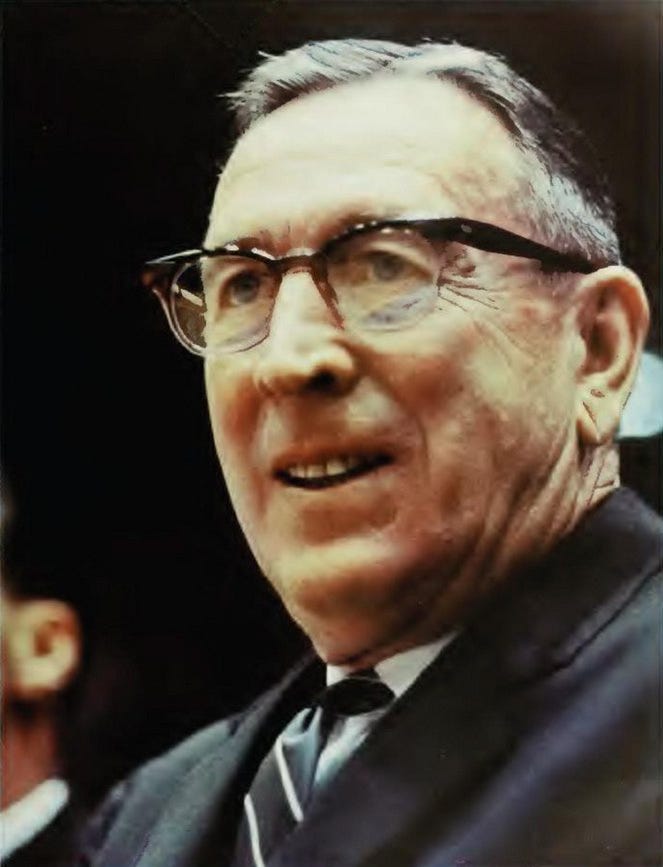John Wooden: The Philosopher-Coach
I first heard of John Wooden in the early 1980s when Dan Gable’s Iowa wrestling teams put together a string of nine consecutive national championships. When the press talked about Iowa wrestling’s accomplishments, they would mention other great historical sports teams like Wooden’s UCLA basketball teams of the 1960s-1970s which won seven straight national titles. UCLA’s achievements during Wooden’s 27 years are staggering – ten national championships in 12 years, four perfect 30-0 seasons, and an NCAA basketball record of 88 consecutive victories. On TV, they would show old clips of Wooden calmly coaching from the sideline with a rolled-up program in his hand.
I would later discover that John Wooden was also an incredible basketball player at Purdue, becoming the first to be named All-American three times. Wooden was the first person ever inducted into the basketball hall of fame as a player and a coach. I noticed that college basketball’s annual player of the year award was named the Wooden Award.
But I did not truly appreciate Wooden’s greatness until the past ten years. After my wife passed away and I started reading more, I came across Wooden’s name everywhere. Great authors like Jon Gordon, John Maxwell, Ken Blanchard, Stephen Covey, and Jim Collins mentioned him frequently.
While browsing at Barnes and Noble years ago, I came across a little blue and yellow book named “Wooden: A Lifetime of Observations and Reflections On and Off the Court.” Midwestern American values oozed out of the book as I paged through it.
Wooden wrote a lot about growing up on a farm in southern Indiana in the early 20th century and how much he learned from his mom and dad. When Wooden graduated from grade school, his father gave him a little card that Coach Wooden carried with him for the rest of his life.
The card listed “Seven Things to Do”:
Be true to yourself.
Help others.
Make each day your masterpiece.
Drink deeply from good books, especially the Bible.
Make friendship a fine art.
Build a shelter against a rainy day.
Pray for guidance and count and give thanks for your blessings every day.
I now have that list hanging in my office at work, a constant reminder of the standard I strive to live by.
When I was at college, my best friend/roommate completely surprised me once by saying he was jealous of me. My friend was a smart, athletic kid from a wealthy, nice family. He explained himself, saying that it was because my mom and dad never put any big expectations on me. My parents never expected me to go to an Ivy League school or become a doctor, a lawyer, or even a farmer. Whatever I did was OK – everyone knew I was doing my best.
My friend was partly right. While my parents didn’t have big goals for what I achieved, they had the highest expectations of how I would behave and that I would do the right thing. Don’t lie. Don’t cheat. Don’t steal. Don’t whine or complain. If you want something bad enough, work hard and go get it.
I remembered this moment and reflected on it recently while creating a presentation for my men’s church group about my life and how I found God. It struck me how similar my mom and dad’s philosophy was to what Coach Wooden’s dad taught him and his three brothers, what John Wooden called his dad’s “two sets of threes.”
Our families’ idea of success was similar also. I watched a documentary where John Wooden said that, as a young high school coach, he wanted to improve on the definition of success in Webster’s dictionary. Wooden thought success was more than material possessions or prestige.
Wooden found inspiration in a short verse he read:
At God’s footstool to confess,
a poor soul knelt and bowed his head.
“I failed!” he cried.
The Master said, “Thou didst my best. That is success.”
This passage led to Wooden’s definition:
Success is peace of mind that is the direct result of self-satisfaction in knowing you did your best to become the best that you are capable of becoming.
It is hard to believe, but even though Coach Wooden achieved so much in basketball, it pales to what he did off the court. He had a wonderful 52-year marriage to his wife Nellie before she died of cancer in 1985 at 73. They had two children, seven grandchildren, and 13 great-grandchildren. He influenced so many people both in and out of basketball. He ran basketball camps and gave speeches after retiring from coaching UCLA. He wrote 11 books after he turned 90!
After I finished giving my church men’s group presentation a couple of weeks ago, the older gentleman who led the group started talking to me. He noted the similarities in our lives. He spoke about growing up in a small farm town in Indiana and remembered baling hay when he was young. The man then pulled a little card from his wallet – a little card listing John Wooden’s dad’s seven point creed and two sets of threes.
God, as we watch Final Four basketball this weekend, please help us remember and strive to live up to the high standards of Coach Wooden.
Links:
Wooden: A Lifetime of Observations and Reflections On and Off the Court
The Wooden Effect weekly newsletter – great for a regular dose of Coach Wooden’s wisdom
Image credit: Alamy
Sharing Midwestern stories of faith, family, work, and sports



